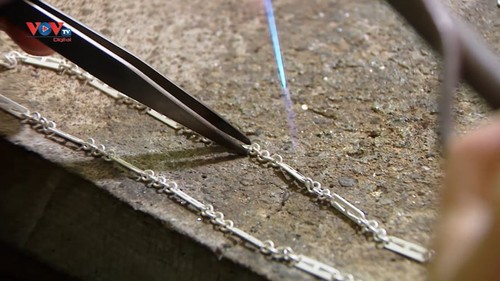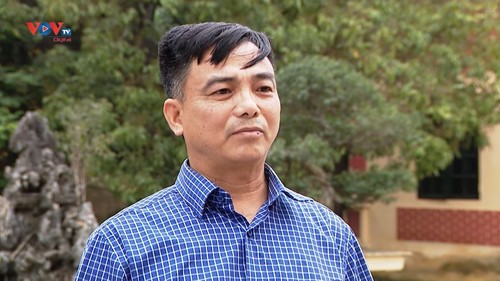 Hue Lai silver-carving village in Hung Yen province is famous for its unique and sophisticated products. (Photo: truyenhinhdulich.vn) Hue Lai silver-carving village in Hung Yen province is famous for its unique and sophisticated products. (Photo: truyenhinhdulich.vn) |
Village elders say silver-carving was not the original craft in Hue Lai. In the early 1990s, several locals went to Chau Khe village in Hai Duong province to work and brought the silver-carving craft to Hue Lai village. Villagers adopted the craft, which requires meticulousness, diligence, and skillful hands.
Do Xuan Chuyen, Director of the Phu Ung Gold and Silver Cooperative, recalled the time when he learned the craft in Chau Khe village.
“At that time, there were only a few villagers engaged in the craft. When I returned to my hometown, we set up the Phu Ung Gold and Silver Cooperative and asked the authorities to establish the Hue Lai Gold and Silver Craft Village.”
“Hue Lai villagers then started their own businesses and opened gold and silver shops nationwide to sell the village's products. Hue Lai craft village has been developing steadily. Six years after the cooperative was established in 1998, Hue Lai was recognized as a craft village,” Chuyen noted.
Creating a silver-carving jewelry product is a multi-stage process. First comes modeling, the most important stage. The second step is to engrave on hard wax which is turquoise or dark green. Wax models can be made manually or by machine. If done by hand, the necessary tools are knives of various sizes, saw blades, needles, files, small drills, and small lathes.
The next stages include wax pumping, gypsum pouring, metal melting, molding, and taking out the raw product, attaching stones, and polishing the product. The final stage is to check the product quality.
A Hue Lai craftsman named Nguyen Van Thu said, “Every step requires meticulousness. You must be careful to turn out beautiful silver necklaces and other jewelry.”
The village’s most popular products are necklaces, bracelets, and rings. One of the things that make the products popular is their purity. And the variety of styles and sizes matches the diversity of the customers’ taste.
Pham Thi Thu Huyen, a customer from An Thi district, Hung Yen province, praised the quality of Hue Lai gold and silver. “The designs and models keep up with the current trends. The jewelry is bright and doesn’t tarnish. I’m a woman who likes an elegant, sophisticated style. Hue Lai gold and silver products match my tastes,” Huyen added.
There were times when the Hue Lai silver carving craft was declining. Many local households gave up the profession.
 Tran Cong Thien, Deputy Chairman of the Phu Ung communal People's Committee (Photo: truyenhinhdulich.vn) Tran Cong Thien, Deputy Chairman of the Phu Ung communal People's Committee (Photo: truyenhinhdulich.vn) |
Tran Cong Thien, Deputy Chairman of the Phu Ung communal People's Committee, says the commune has implemented a project to preserve and promote the traditional craft.
“Every year during the summer vacation, classes are set up for local children. We train them and give them jobs, which help increase their family’s income and stabilize their lives,” said Thien, adding, “Some villagers have gone to Vientiane, Laos, to do business. Others have opened shops in provinces and cities across Vietnam. Some are still engaged in the craft in their hometown.”
Hue Lai currently has 200 households with 1,000 workers engaged in goldsmithing. The district helps villagers obtain capital to expand their production and increase their promotion and advertising.
Nguyen Van Hoang Thien, Deputy Head of the Economic Infrastructure Section of An Thi district, said that they’ve organized trade fairs, exhibitions, and trade promotion events, and advertised products on mass media.
“We’ve mobilized investment in handicraft development to diversify and expand domestic and foreign markets. Handicraft establishments and craft villages have been encouraged to use new technology to improve productivity and quality,” said Thien.
The silver-carving products of the Phu Ung Gold and Silver Cooperative were selected as outstanding rural industrial products of the northern region in 2014. Hue Lai silver-carving village’s fame has spread throughout Vietnam and its products are now exported to China, Laos, and Cambodia.